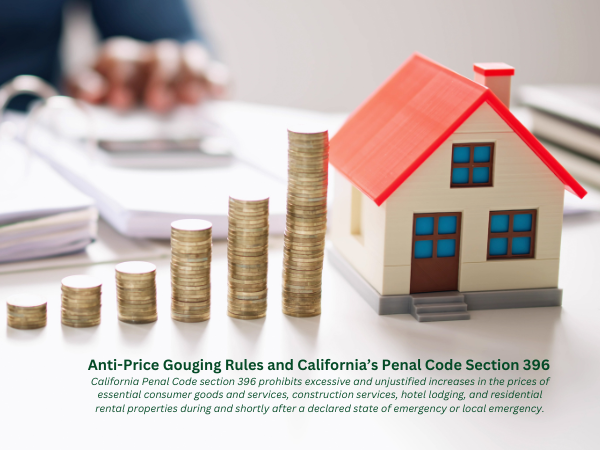Anti-Price Gauging Rules and California’s Penal Code Section 396
Introduction
Following the recent wildfires and the displacement of over 90,000 individuals, many housing providers are eager to help displaced individuals. However, landlords need to be aware of legal responsibilities when setting rental prices during a declared state of emergency.

Overview of Price Gouging Laws
- Prohibited Price Increases: Under California Penal Code Section 396, it’s illegal to increase prices by more than 10% during a state of emergency.
- New Services or Rentals: If a service or rental property was offered after the emergency declaration, the price cannot exceed 50% above the seller’s cost.
- Duration of Protections: Protections apply for 30 days after the emergency declaration, but for reconstruction and emergency cleanup services, protections last for 180 days.
Scope of Law
- The law applies to goods, repair services, transportation, storage, hotel accommodations, and long-term rental housing.
- Exceptions exist for increased costs in labor, goods, or materials. For rental housing, rent increases over 10% are allowed under specific conditions.
Rent Increases
- General Limitation: Rental prices cannot be increased by more than 10% for rental units during an emergency.
- Exceptions: Rent increases may exceed 10% if:
- Costs for repairs or maintenance have increased.
- The increase was contractually agreed upon before the emergency.
- No Exceptions for Types of Properties: The law applies to all rental housing, including short-term rentals, with no exceptions for property type or ownership.
Rental Housing Specifics
- Renters during the emergency may have their rent increased, but not by more than 10%.
- For rental units that become vacant, landlords may adjust the rent to market rates, but it’s limited to 10% increases.
Penalties
- Violations can lead to:
- Criminal prosecution with up to one year in county jail and/or a fine of up to $10,000.
- Civil penalties of up to $2,500 per violation.
- Enforcement: The Attorney General, local district attorneys, and city prosecutors can enforce the law.
What is Price Gouging?
- Price gouging occurs when sellers increase prices significantly during emergencies to exploit consumer needs.
Is Price Gouging Illegal in California?
- Yes, the law prohibits increases of more than 10% for many goods and services after an emergency declaration. New goods or services can be sold for no more than 50% above their cost.
When Does the Statute Apply?
- Protections apply immediately after a state of emergency declaration and generally last for 30 days (or up to 180 days for specific services).
How to Check for Emergency Declarations?
- Emergency declarations are available on the Governor's website and the Office of Emergency Services.
Impact on Rental Housing
- Rental prices cannot exceed 10% after an emergency unless:
- The increase is due to repair costs or was previously agreed upon.
- For new rental properties, prices must be below 160% of the fair market value.
Eviction and Re-Renting
- It’s illegal for landlords to evict tenants and re-rent properties at higher prices than allowed under the anti-price gouging statute.
Local Ordinances
- Local price gouging ordinances may apply in addition to state protections, and landlords should check for city or county regulations that might affect their properties.
Landlords and housing providers must understand their responsibilities under California’s anti-price gouging law, especially during declared emergencies. Price increases are limited, and penalties for violations can be severe. Landlords should consult legal counsel when considering any rent increases to ensure compliance with state and local laws.
